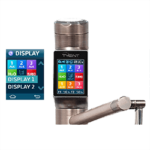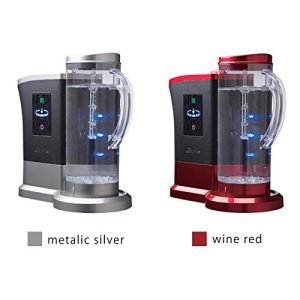- Home
- Health
- Water Softener Guide
- Water Treatment
Private Sewers & Septic Systems
- About Private Sewers Sysytem And Septic Systems
- Lateral Root Notification Program
- Fats, Oil & Grease
- Spills & Black Water Valves
- Help Protect The Enviroment
- Septic Systems
- About
Understanding Mineralized Water: Is It Worth the Hype?
Natural vs. Artificial
The mineralized water we’re discussing here mirrors the natural cycle water undergoes in our environment. It mimics the water that moves through streams, brushing against stones, absorbing crucial trace elements such as magnesium, calcium, zinc, and iron along its journey.
Numerous water filtration systems utilize gravity to mirror this natural filtration and mineralization process, aiming to provide water that is as natural as what we find in the wild. However, it’s essential to distinguish between mineralized water (artificially fortified) and mineral water (natural).
Defining Mineralized Water
 In essence, mineralized water is filtered water that has been fortified with select vitamins and minerals. The added nutrients vary depending on the brand. Unlike natural mineral water, mineralized water is artificially produced. It’s crucial to read the label to know what you’re consuming because not every company is transparent about the water’s origins.
In essence, mineralized water is filtered water that has been fortified with select vitamins and minerals. The added nutrients vary depending on the brand. Unlike natural mineral water, mineralized water is artificially produced. It’s crucial to read the label to know what you’re consuming because not every company is transparent about the water’s origins.
11 Benefits of Drinking Mineralized Water:
1. Efficient Hydration:
Mineralized water isn’t just about quenching thirst. The minerals present in the water, in conjunction with its unique structure, enable quicker absorption into the body’s cells. This can lead to enhanced hydration, especially for the skin, giving it a more moisturized and radiant appearance.
2. Rich in Electrolytes:
3. Enhances Physical Performance:
 Essential minerals like calcium and magnesium play crucial roles in muscle function. They facilitate muscle contraction and relaxation, ensuring optimal muscle response and reducing the risk of muscle cramps during strenuous activities. Regular intake of mineralized water can potentially support athletic performance.
Essential minerals like calcium and magnesium play crucial roles in muscle function. They facilitate muscle contraction and relaxation, ensuring optimal muscle response and reducing the risk of muscle cramps during strenuous activities. Regular intake of mineralized water can potentially support athletic performance.
4. Brain Health:
Our brain, like any other muscle, requires specific nutrients to function at its best. Potassium, for instance, is vital for transmitting electrical signals that enhance memory and cognitive processes. By drinking mineralized water, you could be supporting your brain’s overall health and performance.
5. Provides Vital Minerals:
Hypertension or high blood pressure is a growing concern worldwide. Calcium and magnesium are known to play roles in blood pressure regulation. By balancing electrolyte levels in the body, these minerals can help stabilize blood pressure, promoting cardiovascular health.
6. Reduces Bad Cholesterol:
7. Joint Health:
8. Assists in Fat Metabolism:
Our bodies require specific minerals to catalyze the breakdown of fats. Mineralized water, rich in these catalysts, might support the body’s metabolic processes, promoting efficient fat metabolism and possibly aiding in weight management.
9. Strengthens Bones:
Calcium is essential for bone health. While dairy products are a well-known source of calcium, mineralized water offers an additional source, supporting bone density and overall skeletal health. This can be especially beneficial for individuals with lactose intolerance or those who abstain from dairy.
10. Alkalinity:
An overly acidic diet can lead to several health problems. Alkaline water, which is a characteristic of many mineralized waters, helps neutralize this acidity, maintaining a balanced pH in the body. This balance can contribute to better digestion, increased energy, and potentially prevent certain diseases.
11. Digestive Health:
A balanced pH is essential for optimal digestive health. Alkaline mineralized water can promote a favorable environment in the stomach, aiding in digestion, reducing issues like acid reflux, and promoting the absorption of essential nutrients.
Type of Water | Description | Benefits | Concerns |
|---|---|---|---|
Regular Filtered Water | Water processed to eliminate contaminants using methods such as reverse osmosis or chemical purification. | Easily accessible and can be as handy as tap water. Various filtration devices are available, from faucet attachments to pitchers. Eco-friendly and generally affordable. | Filters need timely replacement to ensure water quality. If not replaced, there's a risk of drinking impure water. |
Mineral Water | Naturally sourced water contains inherent minerals like calcium, magnesium, and sodium. | Distinctive taste due to natural minerals. Consumers often prefer the taste variety and the added health advantages from the minerals. | The mineral content can be quite low despite the name. |
Mineralized Water | Water that has had minerals artificially introduced. The mineral composition can vary between brands. | Enriched with specific minerals that can supplement a healthy diet, potentially offering numerous health benefits. | Lack of standardization means brands can vary significantly. It's essential to read labels carefully to understand what you're consuming. |
The Verdict on Mineralized Water
In conclusion, mineralized water is water with artificially added minerals to replicate natural mineral water. Though there’s a difference between naturally occurring mineral water and its synthesized counterpart, most mineralized waters available today offer health benefits.
Like regular water, mineralized water hydrates, satisfies thirst, and aids digestion. Its additional minerals can even enhance its health effects. The primary concern is the slightly elevated cost compared to regular water. Investing in a home filtration system might be a solution to counteract these expenses.
















